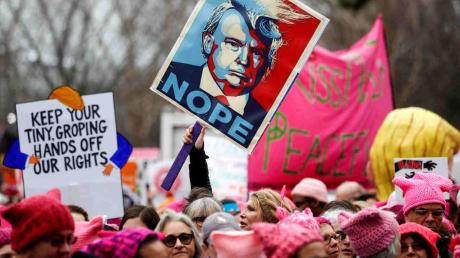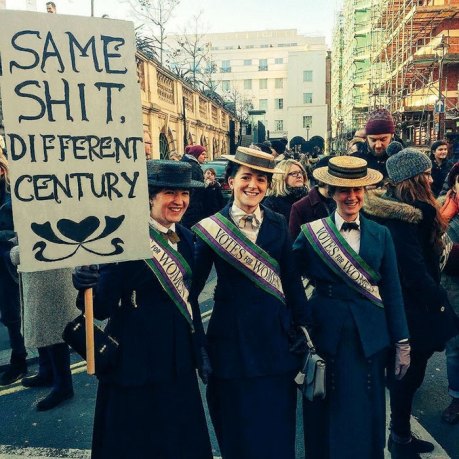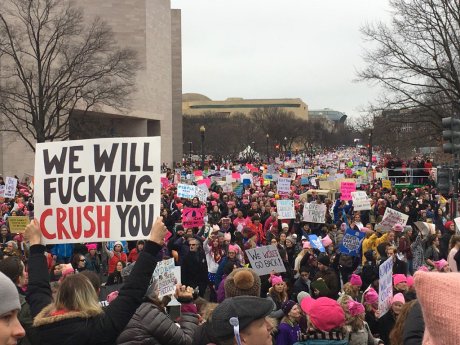
Blaming liberals is the fun game that anybody can play. For the right, it’s a multi-million-dollar industry but liberals do it to themselves for free. Many of them on Twitter spent most of the first weekend of the Trump administration debating whether it’s OK to punch a neo-Nazi, or rather whether it’s OK to laugh at a meme of someone else punching a neo-Nazi, lest it make us as bad as Nazis, as if the defining characteristic of Nazism were thumping people and not, say, genocidally racist nationalism. (Note: “Liberal” can mean many things but, as I’m mostly discussing US politics, I’m using it here in the very broad American sense of “the left”.)
While punching-a-Nazigate rolled on, millions of people in seven continents (yes, even Antarctica) joined the Women’s March on Saturday to protest the Trump presidency. It was a remarkable, unprecedented event but, inevitably, a parade on which some people couldn’t help but rain. Times columnist Camilla Long tweeted: “I’m afraid this women’s march just feels like a middle-class, entitled white girl orgy of virtue-signalling. A pity,” thus casually erasing millions of protesters outside of that demographic and framing the basic act of protest as self-indulgent showing off. One music critic was somehow offended by artists who refused to perform at the inauguration: “Not playing for the president-elect, or going one further and publicly decrying him, is a form of virtue-signalling, and symbolic of the myopia that led to his shock victory in the first place.” The ostensibly liberal columnist Dan Hodges was dismayed that a protest might foreground the niche interests of half the world’s population: “Do the people organising a women’s march against Donald Trump realise it’s precisely this sort of stuff that lead to Donald Trump.” [sic] Labour MP Richard Burgon, a loyal Corbynite, agreed with the Blairite Hodges for once in his life: “Trump inauguration – what can happen when centre/left parties abandon transformation of economic system and rely on identity politics.”
I’ve seen versions of this argument coming from both centrists and socialists but the clearest expression was a Spectator column by Brendan O’Neill, the tireless pundit who makes a living by repeating right-wing talking points while pretending he’s not right-wing. In a four-lane pile-up of shitty writing, O’Neill blamed liberals for Trump because, among other things, they “treated owning a gun and never having eaten quinoa as signifiers of fascism”, “beatified Caitlyn Jenner”, “thought correcting people’s attitudes was more important than finding them jobs” and “banned super-size sodas and smoking in parks.” (I should say here that I enjoy smoking in parks and can take or leave quinoa so maybe I’m off the hook.)
By this logic, Trump’s victory is divine punishment for the myopic arrogance of believing in equal rights, and any dissent, whether it’s the Women’s March, a Samantha Bee monologue or a speech by Meryl Streep, is not just fruitless but counterproductive. Forget the role played by the Republican Party, the right-wing media or the people who actually voted for Trump — it was all the fault, like everything else, of the metropolitan liberal elite. It’s a neat intellectual finger-trap: the more you oppose Trump, the more you are to blame for Trump. If you ask not to be hit, then you are to blame for being hit. Shut up, basically.
Of course, any political party that loses an election needs to ask some searching questions but not to read that loss as a crushing repudiation of its core principles which requires it to shove aside every tranche of its electoral coalition that isn’t white men. Especially when Trump won the electoral college by less than 80,000 votes in Wisconsin, Michigan and Pennsylvania, while losing the popular vote by almost three million, and has an approval rating 20-30% lower than his three predecessors enjoyed at the equivalent stage. This isn’t McGovern ’72 or Mondale ’84. There’s a difference between reflection and masochism, between rethinking tactics and replacing beliefs.
As Helen Lewis writes in the New Statesman, the idea that Clinton lost because she campaigned on identity politics is a myth. Analysis of her speeches and debates shows that she mentioned jobs more than any other issue, and indeed more than Trump did — what’s more, Trump played to identity (of the white variety) more than Clinton did. Clearly Clinton’s message didn’t land as powerfully as it needed to, but it’s not because, as O’Neill absurdly claimed, “you talked more about gender-neutral toilets than about home repossessions.” The very phrase “identity politics”, like “political correctness” or “virtue signalling”, has been stripped of its precise original meaning and coopted by the right to mean “having liberal principles in public”. Stand for the rights of women? Careful, you’ll spook the menfolk. Advocate racial equality too loudly? Well, you’re asking for racism.
This argument implies that the existence of a backlash means you were wrong in the first place. Nixon won two elections partly thanks to Silent Majority resentment towards civil rights and the anti-war movement, but those movements were on the right side of history. This is what reactionary waves do: they react. The progressive movements that they are reacting to have no obligation to apologise or retreat. They fight back.
Doubtless there are cases of clumsy and illiberal overreach on college campuses but squabbles over Halloween costumes at Oberlin aren’t impacting the Rust Belt. This time, one of the backlash’s biggest targets was Black Lives Matter, a campaign that simply asks that innocent people not be killed by police officers. You don’t apologise for trying to save lives. Nor for fighting to grant basic rights to trans people in the face of legislative atrocities like the North Carolina bathroom bill. Exactly which of these people was Clinton meant to throw under the bus so as not to rile the straight, white, male Trump voters? This argument originates from, and benefits, the right. Every time someone on the left endorses it, my heart sinks. As Jade Azim writes in her response to Burgon and Hodges: “Don’t imply that our life experiences are a distraction.”

Another myth is the idea that liberals are behoven to give Trump a chance. Camilla Long again: “Throwing a tantrum over a democratic vote is pathetic.” As soon as Obama got into office, the Republicans were determined to thwart him. For the next eight years, their relentless obstructionism drove a coach and horses through the norms of government, from denying Obama the right to have his nomination for a new Supreme Court justice heard in the Senate to coming within hours of forcing the US to default on its debts. Meanwhile, the Birthers, led by Donald J Trump, questioned the very legitimacy of his presidency. How’s that for a tantrum?
This was Obama, an even-tempered optimist who campaigned twice on a message of national unity and left office without a single major scandal on his watch. Trump is a man who, before he took the oath of office, promised to ban Muslims from entering the country; who described the majority of Mexican immigrants as drug dealers and rapists; who mocked a disabled reporter, then lied about it; who was recorded boasting about sexual harassment; who thought the best way to woo African-American voters was by describing their neighbourhoods as benighted hellholes; who demonised the press; who refused to disclose his tax returns; who threatened to jail his opponent; who chose Breitbart’s Steve Bannon as his Chief of Staff; who had so many conflicts of interest that he was arguably in breach of the Constitution’s emoluments clause; whose election victory was tarnished by evidence of voter suppression and Russian intervention; and who lied every time he opened his mouth. In what universe does he deserve the good will that the GOP refused to grant to Obama?
Ah, but the masochists say, we must understand the Trump voters. We must get out of our elitist echo chambers and understand the rage of the white man. With the same effort that Trump voters devoted to understanding the lives of black people in cities who voted for Obama? That wouldn’t take very long. Certainly any US politician should be concerned by the hollowing out of post-industrial communities, the health problems, the suicide rates, the stagnant wages. But there’s no obligation to buy into the noxious fable that these problems are down to political correctness and immigration rather than long-term structural failures. On the contrary, steering into the swamp of white populism will only make finding effective economic solutions more difficult. Liberals should resist the urge, in Britain as well as the US, to coweringly endorse a phony narrative in the hope of winning friends. Women and people of colour are at the forefront of the anti-Trump movement because they know full well that there is nothing to be gained from asking why people hate you and what you might do differently, because they will hate you anyway.
Liberals cherish their high-minded belief in the efficacy of open debate but that faith requires some reassessment when the new President actually lost three debates on national television, and when the facts on which fruitful debate depends are deliberately muddied on an industrial scale. There is no echo chamber bigger and more airtight than that of the right. For decades, talk radio, Fox News and now websites such as Breitbart have constructed a parallel universe in which liberals are to blame for everything and Hillary Clinton is a criminal mastermind, if not an actual murderer. In the dark corners of Reddit and elsewhere, the alt-right and Men’s Rights Activists have pieced together a galaxy of grievances, before taking their virulent white nationalism, aggressive misogyny and crappy memes to Twitter. They’re not up for a healthy chat.
Anyone who has debated politics on social media will know that a small percentage of people are open to rethinking their position while the majority won’t budge an inch. Likewise, in a country as polarised as the US there is no point trying to win over members of the Republican base who would rather eat broken glass than vote for a Democrat. Work hard to win over the undecided voters where you can but don’t waste your time trying to persuade the unpersuadable. Out-fight them, out-organise them and out-vote them instead. And fight a little dirty if necessary. When people claim that any less than spotless behaviour (like, say, punching a neo-Nazi) gives Trump and his allies an “excuse” to push back, I wonder where they’ve been this past year and why they think Trump ever needs an excuse. He won by bringing a gun to a knife fight (although he insisted that it was in fact a knife and that anyone who said it was a gun was “fake news”).
Have we not been paying attention? Have we learned nothing? Is the threat to progressive values not sufficiently clear? This is a promising start to the long, tough of resistance to the Trump administration. The pressing question for liberals is whether their priority is maintaining the high ground or winning. I think it’s time to drop the self-flagellation and focus on the fundamental values at stake. The right will never stop trying to kick liberals in the crotch. Don’t offer to hold their coat while they do it.
[Note: As a British citizen I feel a little self-conscious about writing about resistance to Trump. Unlike my American friends, I do not have to live under him, nor do I have a democratic voice with which to oppose him. But I felt compelled to write this for two reasons. Firstly, the Women’s March was an international event, reflecting worldwide anxiety about Trump. Secondly, when discussing liberal response to populist nationalism, Trumpism is a clearer case than Brexit. It is largely partisan phenomenon with a ready-made opposition in the shape of the Democratic Party. Brexit cut across party lines, dividing coalitions, and the Labour Party’s current contortions illustrate how much more complicated it is to mount a unified opposition.]

